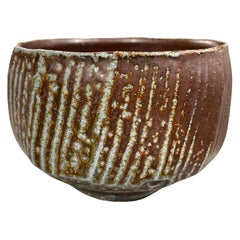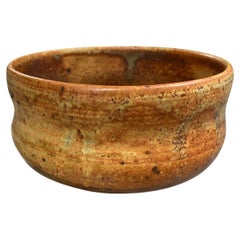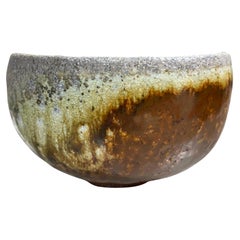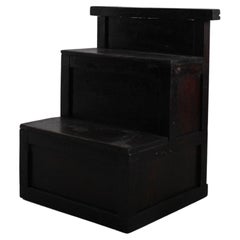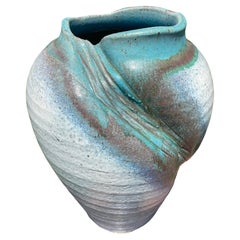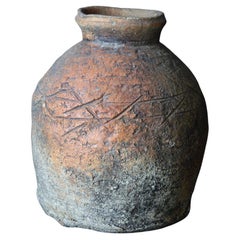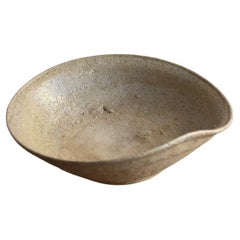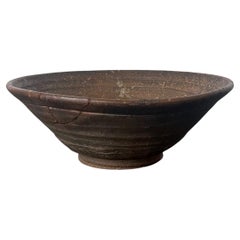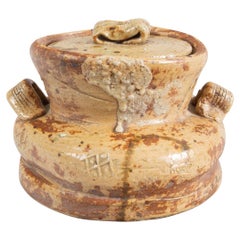Wabi Sabi Tea
1
to
4
88
12
73
33
29
26
24
23
17
11
10
9
8
7
7
4
3
2
2
2
1
1
1
1
1
1
1
1
9
8
7
4
2
Sort By
Japanese Asian Signed Studio Pottery Wabi-Sabi Ceramic Glazed Chawan Tea Bowl
Located in Studio City, CA
Wabi-Sabi aesthetic (which is so revered and coveted in Japan) - the appreciation of beauty that is
Category
20th Century Japanese Showa Ceramics
Materials
Stoneware
H 3 in W 4.5 in D 4.5 in
Japanese Asian Signed Studio Pottery Wabi-Sabi Ceramic Glazed Chawan Tea Bowl
Located in Studio City, CA
with various shifts in colour and texture.
This particular piece encompasses the Japanese Wabi-Sabi
Category
20th Century Japanese Showa Ceramics
Materials
Earthenware
H 2.5 in W 4.5 in D 4.5 in
Japanese Asian Signed Studio Pottery Wabi-Sabi Ceramic Glazed Chawan Tea Bowl
Located in Studio City, CA
personal favorites.
This particular piece encompasses the Japanese Wabi-Sabi aesthetic (which is so
Category
20th Century Japanese Showa Ceramics
Materials
Stoneware
H 3.25 in W 5.25 in D 5.25 in
Rare Late Edo Period Japanese Tansu Steps Wabi Sabi
Located in London, GB
A large set of Japanese Edo period paper-lined steps used for the storage of tea.
Heavily
Category
Antique Mid-19th Century Japanese Ladders
Materials
Cedar
Extraordinary Large And Tall Japanese Hand Thrown Wabi Sabi Vase
Located in South Burlington, VT
shigaraki kiln hand thrown vase thrown in a "wabi sabi" outcome that high lights its handsome distorted
Category
Mid-20th Century Japanese Showa Sculptures and Carvings
Materials
Pottery
Antique Shigaraki Jar "Uzukumaru"/Japanese Vase/14th-16th Century/Wabi-Sabi
Located in Kyoto-shi, Kyoto
During the Muromachi Period (1392–1573), the concept of wabi-sabi was formed from the tea ceremony
Category
Antique 15th Century and Earlier Japanese Antiquities
Materials
Ceramic
Free Shipping
H 5.71 in W 4.73 in D 4.73 in
Japanese Very Old Excavated Pottery Bowl / 12th-13th Century / Wabi Sabi Object
Located in Sammu-shi, Chiba
, but most of them are lost and damaged, so there are not many left now.
However, tea bowls are
Category
Antique 15th Century and Earlier Japanese Other Decorative Bowls
Materials
Pottery
H 2.09 in W 6.82 in D 6.19 in
Korean Ceramic Kakinoheta Chawan Tea Bowl
Located in Atlanta, GA
repair on the rim of the bowl as shown. The appeal of the bowl lays in its rustic and wabi-sabi quietude
Category
Antique 17th Century Korean Other Ceramics
Materials
Ceramic
Iga Mizusashi 'Water Container for the Tea Ceremony'
Located in Hudson, NY
requirements for wabi-sabi, which appreciates the beauty in imperfections of kiln firing. These accidental
Category
Antique Early 18th Century Japanese Edo Ceramics
Materials
Ceramic
Antique Japanese Shino Ware Chawan Tea Bowl
Located in Atlanta, GA
a ghost face on a crouched figure. The iconic milky white glaze displays a wabi-sabi style with
Category
Antique 18th Century Japanese Edo Ceramics
Materials
Ceramic
Korean Ceramic Irabo Tea Bowl Chawan Joseon Dynasty
Located in Atlanta, GA
for their rustic appeal and wabi-sabi spirit. Irabo is characterized by its coarse and sandy clay that
Category
Antique 17th Century Korean Other Ceramics
Materials
Ceramic
Antique Korean Mishma Tea Bowl Chawan Joseon Dynasty
Located in Atlanta, GA
lines were historically repaired by superb Kintsugi, adding a mysterious wabi-sabi appeal to the piece
Category
Antique 17th Century Korean Other Ceramics
Materials
Ceramic
Korean Ceramic Ido Tea Bowl Chawan Joseon Dynasty
Located in Atlanta, GA
unique wabi-sabi aesthetics. Ido thus became elevated from peasant's bowl to the desirable and sought
Category
Antique 17th Century Korean Other Ceramics
Materials
Ceramic
Korean Ceramic Ki-Irabo Tea Bowl Chawan Joseon Dynasty
Located in Atlanta, GA
Japanese, and they are priced for their rustic appeal and wabi-sabi spirit. Irabo is characterized by its
Category
Antique 17th Century Korean Other Ceramics
Materials
Ceramic
Ceramic Stoneware Tea Bowl in Shino Style by Warren Mackenzie
By Warren MacKenzie
Located in Atlanta, GA
fired clay underneath, creating a wabi-sabi visual effect. The piece is stamped by the foot ring
Category
20th Century American Modern Decorative Bowls
Materials
Ceramic
Korean Gohon Chawan Tea Bowl for Japanese Market Joseon Dynasty
Located in Atlanta, GA
uneven wabi-sabi manner and shows scattered pooling, especially along the encircling lines on the upper
Category
Antique 17th Century Japanese Edo Ceramics
Materials
Ceramic
Japanese Antique Earthenware Tea Bowl/Edo Period/1700-1800/'Hagi Ware'
Located in Sammu-shi, Chiba
adhesive.
In addition, these days are also very cool with the scenery of wabi-sabi.
The weight of the
Category
Antique 18th Century Japanese Edo Pottery
Materials
Pottery
Tashiko Tazaezu Signed Japanese Hawaiian Studio Pottery Glazed Chawan Tea Bowl
By Toshiko Takaezu
Located in Studio City, CA
overall with a very Wabi-sabi feel and abstract design.
Takaezu was designated a living treasure in
Category
Mid-20th Century American Mid-Century Modern Ceramics
Materials
Earthenware, Pottery
H 3.5 in W 5.3 in D 5.1 in
Tashiko Tazaezu Signed Japanese Hawaiian Studio Pottery Glazed Chawan Tea Bowl
By Toshiko Takaezu
Located in Studio City, CA
potters or an eye-catching stand-alone work in about any setting. Gorgeous overall with a very Wabi-sabi
Category
Mid-20th Century American Mid-Century Modern Ceramics
Materials
Earthenware, Pottery
H 2.75 in W 4.25 in D 4 in
Tashiko Tazaezu Signed Japanese Hawaiian Studio Pottery Glazed Chawan Tea Bowl
By Toshiko Takaezu
Located in Studio City, CA
Wabi-sabi feel and abstract design.
Takaezu was designated a living treasure in Hawaii in 1987.
Her
Category
Mid-20th Century American Mid-Century Modern Ceramics
Materials
Porcelain, Pottery
H 2.5 in W 5 in D 4.25 in
Toshiko Takaezu Signed Japanese Hawaiian Glazed Pottery Chawan Yunomi Tea Bowl
By Toshiko Takaezu
Located in Studio City, CA
brushed colors. It is a unique and one-of-a-kind work with a very Wabi-sabi feel to it.
The piece is
Category
Mid-20th Century American Mid-Century Modern Ceramics
Materials
Pottery
Rakusai Takahashi III Signed Japanese Shigaraki Pottery Chawan Tea Bowl with Box
By Takahashi Rakusai III
Located in Studio City, CA
particular work also encompasses the Japanese Wabi-Sabi aesthetic - the appreciation of beauty that is
Category
Mid-20th Century Japanese Showa Ceramics
Materials
Stoneware
H 3 in W 5.3 in D 5.1 in
Rakusai Takahashi III Signed Japanese Shigaraki Pottery Chawan Tea Bowl with Box
By Takahashi Rakusai III
Located in Studio City, CA
particular work also encompasses the Japanese Wabi-Sabi aesthetic - the appreciation of beauty that is
Category
Mid-20th Century Japanese Showa Ceramics
Materials
Stoneware
H 3.1 in W 5.1 in D 5.25 in
Rosanjin Kitaoji Signed Shino Ware Chawan Tea Bowl Original Sealed Signed Box
By Rosanjin Kitaoji
Located in Studio City, CA
comes with the original signed and sealed wood protective box. The work has a Wabi-Sabi - the Japanese
Category
Mid-20th Century Japanese Showa Ceramics
Materials
Ceramic
H 3.5 in W 5.6 in D 5.5 in
Rosanjin Kitaoji Signed Shino Ware Sake Tea Cup with Original Sealed Signed Box
By Rosanjin Kitaoji
Located in Studio City, CA
base and comes with the original signed and sealed wood protective box. The work has a Wabi-Sabi - the
Category
Mid-20th Century Japanese Showa Ceramics
Materials
Ceramic
H 2 in W 2.8 in D 2.75 in
Japanese Glazed Tsubo Wine Jar, c. 1875
Located in Chicago, IL
honors the spirit of wabi-sabi and recalls primitive medieval Japanese forms.
Additional Dimensions
Category
Antique Late 19th Century Japanese Meiji Ceramics
Materials
Stoneware
Large Chinese Martaban Jar, Ming Dynasty
Located in Pasadena, CA
rim shows an old chip. The jar is in overall good patinated condition. This would add a wabi-sabi
Category
Antique Late 17th Century Chinese Chinese Export Ceramics
Materials
Terracotta
Japanese antique pottery "Shigaraki" large vase/1400-1500/Natural glaze pottery
Located in Sammu-shi, Chiba
depending on the angle, which makes it very attractive.
It is a vase that gives you a sense of wabi-sabi
Category
Antique 15th Century and Earlier Japanese Other Jars
Materials
Pottery
H 19.06 in Dm 15.36 in
A Set of Six Takatori Ware Dishes Now Mounted
Located in Stamford, CT
repair cracked ceramics. As a philosophy, kintsugi is similar to the Japanese philosophy of wabi-sabi
Category
Antique Early 19th Century Japanese Edo Mounted Objects
Materials
Stoneware
Japan hares matcha bowl
Located in PARIS, FR
in may folk tales and legends.
The bowl is irregular shape and decoration are typical of the wabi
Category
Mid-20th Century Japanese Japonisme Ceramics
Materials
Ceramic, Clay
"Gray Crystals" Wall Sculpture- Metallic, modern, bold, monochrome, mid century
By Chloe Hedden
Located in Marmora, NJ
imperfections in the leaf create a Wabi Sabi effect. 'Show Facets' of the sculpture are also enhanced with
Category
2010s Mixed Media
Materials
Wood, Acrylic
"Copper Pyrite" Wall Sculpture- Metallic, modern, bold, monochrome, mid century
By Chloe Hedden
Located in Marmora, NJ
imperfections in the leaf create a Wabi Sabi effect. 'Show Facets' of the sculpture are also enhanced with
Category
2010s Mixed Media
Materials
Gold
"Ultra Violet Crystals" Wall Sculpture Metallic, monochrome, mid century, purple
By Chloe Hedden
Located in Marmora, NJ
imperfections in the leaf create a Wabi Sabi effect. 'Show Facets' of the sculpture are also enhanced with
Category
2010s Mixed Media
Materials
Wood, Acrylic
"Raspberry Shimmer" Sculpture- Metallic, berry, monochrome, mid century, purple
By Chloe Hedden
Located in Marmora, NJ
where shadows glow. Natural imperfections in the leaf create a Wabi Sabi effect. 'Show Facets' of the
Category
2010s Mixed Media
Materials
Wood, Acrylic
Bamboo Brooch in Eighteen Karat White Gold N1 by the Artist
By Polya Medvedeva Jewellery
Located in Berlin, DE
. Although, silver can be attractive in some wabi-sabi designs because of its softness.
The Bamboo brooch is
Category
2010s German Contemporary Brooches
Materials
Gold, 18k Gold, White Gold
Antique Japanese Tsubo Jar with High Relief Crab Design
Located in Atlanta, GA
masters in Edo period highly appreciated their earthy wabi-sabi spirit thus elevated them to cherished
Category
Antique 19th Century Japanese Meiji Ceramics
Materials
Ceramic
American Studio Ceramic Bowl in Shino Glaze by Warren MacKenzie
By Warren MacKenzie
Located in Atlanta, GA
piece that fully embracing the concept of Wabi-Sabi. The chawan is marked with M close to the base rim
Category
Late 20th Century American Japonisme Decorative Bowls
Materials
Ceramic
Hagi Ikebana Vase by Kyusetsu Miwa X Japanese Studio Pottery
By Kyusetsu Miwa X
Located in Atlanta, GA
display beautiful surface with glaze, some kiln burst and crackle as well, adding a wabi-sabi character to
Category
20th Century Japanese Japonisme Ceramics
Materials
Ceramic
Large Japanese Antique Shigaraki Tsubo Jar
Located in Atlanta, GA
for these natural wabi-sabi qualities.
This tsubo makes a striking example of the Shigaraki
Category
Antique 17th Century Japanese Japonisme Ceramics
Materials
Ceramic
Rare Japanese Porcelain Painted Footed Dish Makuzu Kozan
By Makuzu Kozan
Located in Atlanta, GA
lacquer was intentional chosen to contrast the black glazed background, a wabi Sabi effect that was
Category
Antique Early 1900s Japanese Meiji Ceramics
Materials
Porcelain
Organic Modern Coffee/Cocktail Table w/ Spalted California Hackberry, Butterfly
By Michael Olshefski
Located in Los Angeles, CA
is inspired by the ancient art and philosophy of Wabi-Sabi and minimalist modern art, architecture
Category
21st Century and Contemporary American Organic Modern Tables
Materials
Metal, Aluminum, Steel
H 20 in W 50 in D 48 in
Modern Studio Vase Bizen Ware by Jun Isezaki
Located in Atlanta, GA
surface including the base, rendering the piece a strong Wabi Sabi aesthetic.
Jun Isezaki is from a well
Category
20th Century Japanese Organic Modern Ceramics
Materials
Ceramic, Wood
Pair of Japanese Two-Fold Screens with Flower Arrangements and Rare Birds
Located in Milano, IT
. Unlike those used during the tea ceremony, that maintain a natural and austere wabi-sabi construction
Category
Antique 18th Century Japanese Paintings and Screens
Materials
Paper
H 66.93 in W 64.97 in D 0.4 in
Boris Gratry, Nightsky, CH
By Todd Merrill
Located in New York, NY
the artist. Gratry’s axiom closely follows the Japanese perspective of “wabi-sabi” which is centered
Category
2010s Swiss Decorative Art
Materials
Gold Leaf
Boris Gratry, Neptune, CH
By Todd Merrill
Located in New York, NY
the artist. Gratry’s axiom closely follows the Japanese perspective of “wabi-sabi” which is centered
Category
2010s Swiss Decorative Art
Materials
Metal, Gold Leaf
Boris Gratry, Infinity, CH
By Todd Merrill
Located in New York, NY
the artist. Gratry’s axiom closely follows the Japanese perspective of “wabi-sabi” which is centered
Category
2010s Swiss Wall-mounted Sculptures
Materials
Metal, Gold Leaf
Boris Gratry, Rusted Values No. 12, CH
By Todd Merrill
Located in New York, NY
the artist. Gratry’s axiom closely follows the Japanese perspective of “wabi-sabi” which is centered
Category
2010s Swiss Wall-mounted Sculptures
Materials
Metal, Gold Leaf
Awaji Pottery Manipulated Jar Heavy Drip Lava Glaze Wabi Sabi Tea Ceremony Vase
By Awaji Pottery
Located in Wilton, CT
Awaji Pottery jar with dents and slashes covered in layers of thick lava glaze, circa 1930. Impressed export mark. Measures: 8 1/2" high, 9" diameter. Excellent condition.
Category
Vintage 1930s Japanese Art Deco Vases
Materials
Stoneware
Wabi-sabi inspired ceramic plate
By Romy Northover
Located in London, GB
Japanese-inspired style that has won her many admirers on both sides of the Atlantic. Shown in our Tea
Category
2010s More Art
Materials
Ceramic
Apple Orchard Orgy
By Justin Williams
Located in New York, NY
by the Japanese tradition of wabi-sabi tea-bowl making, (beauty in imperfection), in which hundreds
Category
2010s Contemporary Figurative Paintings
Materials
Canvas, Oil, Pigment
Large Wabi Sabi Charred Japanese Coffee/Tea Table
Located in London, GB
A unique, large charred Japanese coffee/tea table.
Heavily patinated top on sculptural charred
Category
Antique 1880s Japanese Coffee and Cocktail Tables
Materials
Cedar
Japanese Fine "WABI SABI" Raku Tea Bowl, Hand-Built and Hand Glazed
Located in South Burlington, VT
Mint condition
From Japan, a beautiful hand-built, painted and glazed, Raku ware tea bowl
Category
Late 20th Century Japanese Showa Ceramics
Materials
Ceramic, Pottery
Japanese Antique Shelf, Tansu, Wabi-Sabi, Cabinetwork
Located in Katori-Shi, 12
tea ceremony(Jpanaese "Sado").
This piece was finished by a highly skilled Japanese craftsman
Category
Early 20th Century Japanese Taisho Furniture
Materials
Wood
Japanese Antique Cabinets, Tansu Storage, Wabi Sabi, Japandi
Located in Katori-Shi, 12
used as a tea chest placed in a tea room.
This furniture was produced using traditional Japanese
Category
Early 20th Century Japanese Taisho Antiquities
Materials
Wood
Chinese Antique Black Glazed Jar / 1500s / Wabi-Sabi Jar
Located in Sammu-shi, Chiba
Japan.
This is a jar around the late 1500s.
This jar is for storing tea leaves.
It has a round
Category
Antique 16th Century Chinese Other Vases
Materials
Pottery
Japanese Antique Paper-Covered Pottery Flower Vase Wabi-Sabi Pot
Located in Sammu-shi, Chiba
paper.
This large vase was used to transport and store tea leaves.
It is covered with paper to
Category
Antique Late 19th Century Japanese Meiji Pottery
Materials
Pottery
Japanese Antique Paper-Covered Small Pottery Vase 1860s-1900s / Wabi Sabi
Located in Sammu-shi, Chiba
that evokes the wabi-sabi aesthetic.
It weighs 3 kg.
Very fortunately, this jar is in beautiful
Category
Early 20th Century Japanese Meiji Vases
Materials
Pottery
Korean antique white porcelain bowl/Kintsugi/16th century/Wabi-sabi object
Located in Sammu-shi, Chiba
Joseon Dynasty (15th-19th centuries).
The 16th century corresponds to the first half.
This tea bowl was
Category
Antique 16th Century South Korean Other Porcelain
Materials
Porcelain
Japanese Antique Wabi Sabi Pottery Vase 1800s-1860s / Flower Vase Tsubo
Located in Sammu-shi, Chiba
).
It was used to preserve tea leaves.
It is covered with paper to prevent moisture.
Due to use over
Category
Antique Late 19th Century Japanese Edo Vases
Materials
Pottery
Japanese Antique Paper-Covered Pottery Vase 1860s-1900s / Flower Vase Wabi Sabi
Located in Sammu-shi, Chiba
with a wabi-sabi sensibility.
Weight: approx. 20 kg.
Please note that water cannot be filled.
Category
Early 20th Century Japanese Meiji Vases
Materials
Pottery
H 33.47 in Dm 18.51 in
- 1
Get Updated with New Arrivals
Save "Wabi Sabi Tea", and we’ll notify you when there are new listings in this category.
Wabi Sabi Tea For Sale on 1stDibs
Find many varieties of an authentic wabi sabi tea available at 1stDibs. Each wabi sabi tea for sale was constructed with extraordinary care, often using ceramic, stoneware and pottery. There are many kinds of the wabi sabi tea you’re looking for, from those produced as long ago as the 18th Century to those made as recently as the 20th Century. When you’re browsing for the right wabi sabi tea, those designed in Art Deco, Arts and Crafts and Modern styles are of considerable interest. You’ll likely find more than one wabi sabi tea that is appealing in its simplicity, but Awaji Pottery and Shigaraki Valley Potters produced versions that are worth a look.
How Much is a Wabi Sabi Tea?
Prices for a wabi sabi tea can differ depending upon size, time period and other attributes — at 1stDibs, they begin at $68 and can go as high as $2,200, while the average can fetch as much as $545.
Questions About Wabi Sabi Tea
- 1stDibs ExpertMay 5, 2023The primary principle of Wabi-Sabi is to appreciate the imperfections found in nature. As a result, Wabi-Sabi emphasizes asymmetry, roughness, simplicity and the use of natural materials and finishes. On 1stDibs, shop a variety of pieces based on Wabi-Sabi principles.
- What is wabi-sabi pottery?1 Answer1stDibs ExpertApril 5, 2022Wabi-sabi pottery refers to earthenware vessels that embody the principles of a Japanese philosophy called wabi-sabi. Proponents of the idea believe that household objects should emphasize function over form, so that they satisfy needs but do not cause people to attach too much meaning to worldly possessions. There is also a focus on finding the beauty in imperfection and simplicity. On 1stDibs, find a collection of wabi-sabi pottery.
- What is an example of wabi-sabi?2 Answers1stDibs ExpertApril 5, 2022Wabi-sabi is the practice of finding the beauty in imperfections. Examples include flowers growing through cracks in the ground, or a broken ceramic bowl made whole again with its imperfections showing through. You’ll find a variety of wabi-sabi pieces from some of the world’s top sellers on 1stDibs.1stDibs ExpertApril 5, 2022One important aspect of wabi-sabi is the beauty in imperfect things, so a good example of wabi-sabi would be asymmetrical or even crude vessels and furniture. On 1stDibs, you’ll find a collection of wabi-sabi furniture and other objects from some of the world’s top sellers.
- What is wabi-sabi furniture?1 Answer1stDibs ExpertApril 5, 2022Wabi-sabi furniture refers to tables, seats and other furnishings that reflect a specific Japanese design philosophy. It involves creating minimalist furniture that has a focus on appreciating the imperfections found in nature. On 1stDibs, find a collection of wabi-sabi furniture.
- Is Wabi-sabi a design style?1 Answer1stDibs ExpertMay 5, 2023Wabi-sabi is technically not a design style, but it has influenced design. The term Wabi-sabi refers to a philosophy that emphasizes accepting imperfection and celebrating the impermanent beauty of nature. This concept has inspired many interior design trends, such as using organic and sustainable materials, selecting upcycled and repurposed pieces and integrating furniture and decorative objects that are unfinished, unpolished and unglazed. Shop a collection of pieces inspired by Wabi-sabi on 1stDibs.
More Ways To Browse
Chopard Green Watch
Tiffany Seattle Washington
Cartier Cuff Watch
Bizen Vase Signed
1967 Cartier Watch
Tiffany Ceramic Bowl
Antique Korean Bowl
Cartier Snake Necklace
Jun Ware
Gourd Screen
Korean Celadon Bowl
Japanese Rice Basket
Tiffany Manchester
Vintage Japanese Sake Cups
Restaurant Ware Vintage
Laurent Loulou Green
Devil Vase
Antique Kintsugi Bowl
